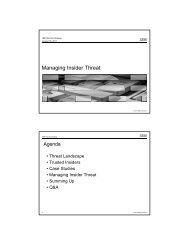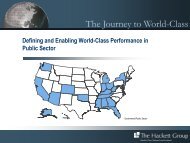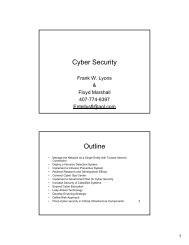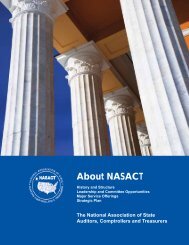Advisory Committee on Tax Exempt and Government Entities (ACT ...
Advisory Committee on Tax Exempt and Government Entities (ACT ...
Advisory Committee on Tax Exempt and Government Entities (ACT ...
You also want an ePaper? Increase the reach of your titles
YUMPU automatically turns print PDFs into web optimized ePapers that Google loves.
The Appropriate Role Of The Internal Revenue Service With Respect To <strong>Tax</strong>-<strong>Exempt</strong> Organizati<strong>on</strong> Good Governance Issuesthe Enr<strong>on</strong> <strong>and</strong> WorldCom sc<strong>and</strong>als that inspired SOX. Moreover, he notedthat the first-year costs of complying with the secti<strong>on</strong> 404 provisi<strong>on</strong>s, asestimated by the Financial Executives Internati<strong>on</strong>al survey, was nearly 50times greater than that originally estimated by the SEC ($60 vs. $1.2 billi<strong>on</strong>);<strong>and</strong> the costs also were regressive, being not proporti<strong>on</strong>al to companysize. 175• Auditors’ N<strong>on</strong>-Audit Services. In a survey of 25 empirical studies <strong>on</strong> theissue of auditors providing n<strong>on</strong>-audit services, Professor Robert Romanoreported that the overwhelming majority (19) found no negative impact <strong>and</strong>stated: “the c<strong>on</strong>clusi<strong>on</strong> that audit quality <strong>and</strong> auditor independence are notjeopardized by provisi<strong>on</strong> of n<strong>on</strong>-audit services is supported not <strong>on</strong>ly by thegreat majority of studies, but by those that use the most sophisticatedtechniques <strong>and</strong> whose findings are most robust to different specificati<strong>on</strong>s oftheir models.” 176• Independent Directors. While there were a number of studies finding somepositive impact with independent directors, evidence from the first largescalel<strong>on</strong>g-time horiz<strong>on</strong> study of the relati<strong>on</strong>ships am<strong>on</strong>g boardindependence, board size <strong>and</strong> the l<strong>on</strong>g-term performance of large Americanfirms indicated that firms with more independent boards did not achieveimproved profitability. 177• Audit <str<strong>on</strong>g>Committee</str<strong>on</strong>g> Compositi<strong>on</strong> to Include Only Independent Directors.Professor Roberta Romano in a review of 16 studies involving auditcommittees reported that the majority, especially those studies using moresophisticated techniques, do not support the hypothesis that an auditcommittee composed <strong>on</strong>ly of independent directors will reduce theprobability of financial statement wr<strong>on</strong>gdoing or otherwise improve corporateperformance. 178• Disclosure. One area where the empirical evidence did indicate acorrelati<strong>on</strong> with positive effects for shareholders involves disclosure-relatedgovernance practices. N<strong>on</strong>e of the studies available at that time, however,c<strong>on</strong>sidered the specific disclosure requirements m<strong>and</strong>ated by SOX.Professor Clark cites, for example, a study examining the positive effect of175Id. at 291-95.176Id. at 295-97. See also Romano, supra note 43, at 1535-37. Professor Romano’s fine article also provides a thorough <strong>and</strong>careful review of studies <strong>on</strong> independent audit committees, executive loans, <strong>and</strong> executive certificati<strong>on</strong> of financial statements, aswell as an analysis <strong>and</strong> critique of the legislative process leading to SOX. A less formal but wider overview of the empiricalevidence, which cites some intriguing additi<strong>on</strong>al studies, is given in Larry Ribstein, Sarbanes-Oxley after Three Years, (draft of June20, 2005), abstract <strong>and</strong> paper available at http://papers.ssrn.com/abstract_id=746884.177Id. at 298-302. See also Sanjai Bhagat & Bernard Black, The N<strong>on</strong>-Correlati<strong>on</strong> Between Board Independence <strong>and</strong> L<strong>on</strong>g-TermFirm Performance, 27 Iowa J. Corp. L. 231-72 (2002). In the n<strong>on</strong>profit c<strong>on</strong>text, see Dana Brakman Reiser, Director Independencein the Independent Sector, 76 Fordham L. Rev. 795 (2007); Kathleen M. Boozang, “Does an Independent Board Improve N<strong>on</strong>profitCorporate Governance?,” 75 Tenn. L. Rev. 83 (2007).178Id. at 302. See also Romano, supra note 43.ADVISORY COMMITTEE ON TAX EXEMPT AND GOVERNMENT ENTITIES (<strong>ACT</strong>) June 11, 2008 82













